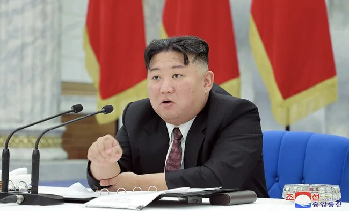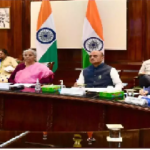North Korea has sacked Pak Jong Chon, the second most powerful military official after leader Kim Jong Un, state media reported. Pak, vice chairman of the Central Military Commission of the ruling Workers’ Party and a secretary of the party’s Central Committee, was replaced by Ri Yong Gil at the committee’s annual meeting last week, the official KCNA news agency said .
No reason for the change was given. Pyongyang regularly revamps its leadership and the year-end party gathering has often been used to announce personnel reshuffles and major policy decisions.
State television showed Pak sitting in the front row of the podium with his head down during the meeting while other members raised their hands to vote on personnel issues. His seat was later shown unoccupied.
He was also absent in photos released on Monday by the official KCNA news agency of Kim’s New Year’s Day visit to the Kumsusan Palace of the Sun which houses the bodies of his grandfather and father, unlike in October when Pak accompanied Kim on a trip to the palace to mark a party anniversary.
The party’s Central Military Commission, which is headed by Kim, is considered the country’ most powerful military decision-making body, above the defence ministry.
Pak’s replacement came as Kim called for developing new intercontinental ballistic missiles and a larger nuclear arsenal to counter the United States and South Korea as key to the isolated country’s 2023 defence strategy.
Pak had rapidly moved up the military ladder from a one-star artillery commander in 2015 to a four-star general in 2020, taking credit for contributing to progress in the country’s short-range missile technology.
In late 2020, Pak was promoted to the politburo and earned the title of marshal, the highest military rank under Kim, and became a leading voice last November against joint South Korea-US military exercises.
Like most other top military aides who went through ups and downs repeatedly under Kim, Pak was briefly demoted in mid-2021 after Kim chided some officials for their handling of North Korea’s anti-coronavirus policy, before being promoted again months later.
Pak’s dismissal comes despite Kim mostly lauding the military’s advances in weapons development during the meeting, unlike other areas where he pointed out some faults and called for improvement.
Oh Gyeong-sup, a fellow at the Korea Institute for National Unification in Seoul, said a recent flare-up in inter-Korea tension over North Korean drones’ intrusion into the South could have played a role.
Officials in Seoul said South Korea sent three drones across the border in response to the intrusion, but there was no response from the North, which Oh said could mean that it failed to detect the aircraft.
“Pak might have taken responsibility for the failure of security operations,” Oh said.
Ri, Pak’s successor, is also a senior military commander who held key positions including chief of the army’s general staff and defence minister.



